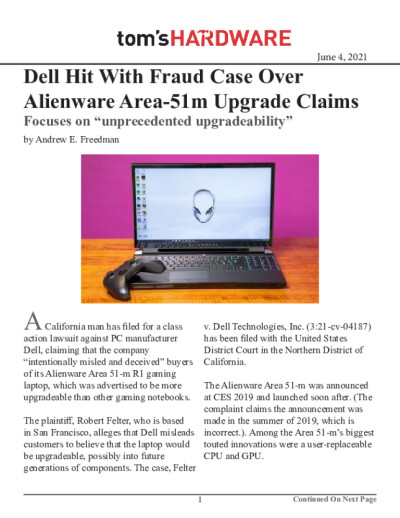![pfas contamination]()
PFAS – Is This Deadly Killer in your Water? Don’t Trust Corporate America to Tell the Truth
There is an interesting drama unfolding in sleepy Burlington, Vermont. It hasn’t attracted much media attention but it should. A company’s own in house lawyer says a plastic manufacturer is lying about dangerous PFAS contamination in rural Vermont and other locations throughout the country.
This story begins in in the 1970’s but we will pick up in May 2016. That month James Sullivan and Leslie Addison and several other residents of Bennington, Vermont filed a lawsuit against Saint-Gobain Performance Plastics Corporation (“Saint-Gobain”). Headquartered in Akron, Ohio, the company claims to be one of the world’s leading plastic manufacturers. Its products can be found everywhere.
James and Leslie filed their lawsuit after tests by the Vermont Department of Environmental Conservation found elevated levels of PFAS in their drinking water. The state has set a recommended limit on PFAS in water at 20 parts per trillion. Their well tested almost 15 times higher at 293 parts per trillion.
Some of their neighbors, who also sued, had PFAS levels in their water measuring as high as 338 parts per trillion. (The environmental law team at Mahany Law is presently suing several paper companies in Maine where drinking water samples have detected PFAS in excess of 20,000 parts per trillion!)
What Is PFAS and Should I Worry?
Before we go on, a brief discussion of the dangers of PFAS is necessary. PFAS is a deadly killer. Because you can’t see it or taste it, many people don’t even know the water they are drinking could kill them or cause other horrible health outcomes. PFAS has been linked to kidney failure and cancer, testicular cancer, birth defects, heart disease and many other health problems.
PFAS (pronounced Pee fas) is short for Per-fluoroalkyl and poly-fluoroalkyl substances. These are manmade chemicals that have been manufactured since the 1960’s.
PFAS compounds are widely associated with firefighting foam but they are also commonly found in nonstick pots and pans, grease resistant paper, paper plates, stain resistant fabrics and cleaning products.
PFAS is not a single chemical. Rather it is a family of chemicals. Some are more toxic than others. One of the most dangerous variants is perfluorooctanoic acid (PFOA), the chemical at issue in the lawsuit against Saint-Gobain.
Although now banned, PFOA is known as a “forever” chemicals because they don’t easily breakdown in the environment nor are these easily passed by the human body. Even microscopic amounts ingested by the body can build up over time and cause severe health effects.
PFOA is often found in the environment and drinking water. Although no longer produced, PFOA can stay in the soil and drinking water aquifers for decades. Just ask the folks in Bennington, Vermont.
How Many People Have Been Exposed to PFAS?
The lawsuit filed by James and Leslie and their neighbors is a class action lawsuit. They are bringing their case on behalf of everyone in the area who may have suffered because of PFAS contamination from the Saint-Gobain plant. Lest you think this problem is isolated to a small town in Vermont, the Environmental Working group concluded in October 2020, that more than 200,000,000 Americans have at least 1 part per trillion of PFAS in their drinking water. Unlike some compounds that appear naturally in our environment, PFAS compounds are entirely man made.
Vermont set the safe level of PFAS at 20 parts per trillion but many experts say it should be much lower (and some say any amount of PFAS could cause cancer.)
Saint-Gobain and Corporate Lies?
Residents of Bennington and North Bennington say that the dangerous levels of PFAS came from the plant today owned by Saint-Gobain. They have a big ally; the Vermont Department of Environmental Conservation identifies the facility as the probably source of contamination. (The company denies the allegations in the lawsuit.)
Until its closure in 2001, the company manufactured Teflon coated fabric. Teflon is a known source of PFAS including the specific compound at issue, PFOA.
To make these fabrics, the coatings are heated to 650 degrees and baked into the fabric. Records show that there were frequent complaints from residents about noxious odors and visible emissions into the air. Records also show that the company disposed of solid wastes and solvents into Bennington’s municipal landfill. That landfill was subsequently closed and designated a Superfund hazardous waste site by the federal government.We believe many chemicals were simply allowed to run into floor drains and ultimately into a nearby creek.
In fairness to Saint-Gobain, they didn’t operate the facility when these complaints were being made but they ultimately bought the company and thus inherited its obligations. To get too much sympathy for Saint-Gobain, there is more on their direct involvement below.
After the lawsuit was filed, Saint-Gobain sought to dismiss the complaint. Their primary attack wasn’t so much as the facts as it was procedural. They claim that Vermont’s rules are unfair and that there were no regulations at the time the contamination occurred.
Their arguments are hollow and the court agreed. Simply because there is no rule or regulation on a specific chemical doesn’t mean that anyone can dump that chemical or allow it to contaminate ground water. We believe that big chemical companies and manufacturers such as Saint – Gobain clearly knew (and ignored) the risks of PFOA.
They also knew what they were buying when they purchased the plant.
Fast forward to 2021 and we thought the case was going to settle. In all lawsuits there is something called discovery. Each side gets an opportunity to take testimony from witnesses (depositions), ask questions (interrogatories) and request documents. Parties to a lawsuit have a duty to be honest in their answers and to tell the truth.
Based on the discovery, parties can often mediate and resolve cases short of a trial. The company had said that just 61 pounds of PFOA rich substance is at issue. (Saint-Gobain appears to be making the “it’s not us” argument by saying there were only a few pounds of toxic material that may have come from the plant.)
Based on the discovery, the parties were headed towards a settlement in which each homeowner would get a fixed sum of money for the diminution of value of their property and homeowners with contaminated wells would get a larger payment to offset water treatment costs. There would also be monies available for medical monitoring of residents.
That was all upended earlier this month.
Saint Gobain Lawyer Claims Company Lied About PFAS Contamination
On April 6, 2021, Amiel Gross, former in-house lawyer to Saint-Gobain, filed a bombshell whistleblower retaliation complaint with the U.S. Department of Labor. Gross says he was fired for expressing concern over the company’s response to PFAS contamination.
According to his complaint,
“This case involves a large multinational corporation, Saint-Gobain, that processed a toxic chemical, PFOA, responsible for polluting the environment, contaminating human drinking water supplies and persisting in the blood streams of thousands of adults and children living near at least three of its factories. The national spotlight focused on Saint-Gobain and its legacy of toxic PFOA pollution only because a brave resident, whose father worked at the one of the Company’s factories and died of cancer, decided to test the local tap water. Massive media attention, governmental agency scrutiny and class action litigation ensued. Several years later, an internal lawyer for the Company, Complainant, discovered there were in fact other Company factories where the toxic chemical was also processed for decades under similar, pollution- generating conditions. The lawyer immediately sounded an internal alarm and escalated the issue to the highest levels; principally, he warned others that the company had a duty to fully investigate, rule out contamination of nearby drinking water sources and ensure other communities were not unknowingly consuming the same toxic chemical. In response, senior leadership of Saint-Gobain instructed him to look the other way, punished him with termination and continued to retaliate against him to this day. This case seeks to remedy Saint-Gobain’s egregious, ongoing corporate misconduct.”
Gross suggests that the company turned a blind eye on PFAS contamination and may have underreported usage of the dangerous PFAS chemicals at several plants.
The Bennington residents have brought an emergency motion to reopen discovery. They want to question Gross and see what information he has. According to Law360, this week a representative of the company said, “[W] we do not believe the deposition of Mr. Gross is warranted.
Thankfully U.S. District Judge Geoffrey Crawford ruled in favor of the residents. He wisely ruled that he wouldn’t be doing his job unless he heard what Gross had to say.
It is unknown how this will affect the settlement. If the company is found to have lied, the damages in the case could be higher and the company could be subject to sanctions. We certainly appreciate the bravery shown by Amiel Gross in stepping forward.
Many More PFAS Contaminated Sites Exist
We urge homeowners to have their wells tested for PFAS. Even if there is no way to prove where the contamination originated, at least know whether your water is safe to drink. As noted earlier, PFAS is odorless and tasteless. Simply because your water tastes okay doesn’t mean it isn’t laced with deadly poison chemicals.
Based on our experience, we often find PFAS near chemical plants, paper mills, landfills and airports (PFAS is used in firefighting foam). In many states such as Maine, biosolids from municipal wastewater plants and paper mills is or was given to farmers to use as fertilizer. That means anyone within a mile of agricultural land could be at risk.
Because PFAS is a forever chemical, there is also a danger that PFAS could be in soil or groundwater years after a plant closed or farm stopped spreading PFAS contaminated sludge. That old factory down the road that was knocked down 40 years ago? It could still be a major source of contamination.
The Vermont case came to light after regulators in Vermont learned that another Saint-Gobain facility in New York was suspected to have contaminated ground water. They decided to test wells in Bennington and found widespread pollution. Former company attorney Amiel Gross says there are several contaminated sites.
A good corporate citizen would alert residents and environmental officials. Saint-Gobain’s corporate slogan is “We are improving daily life.” The exact opposite is true. In our opinion, Saint-Gobain acts like a hit and run driver. They flee the scene of the crime and hope they don’t get caught.
PFAS testing is still in its infancy. Amazon has several low cost test options. If you get a positive result, more extensive testing may be warranted. (Shoot us an email too, we are trying to map all the areas with PFAS contamination.)
Have You Been Hurt or Damaged by PFAS Contamination?
Our PFAS contamination lawyers help families and communities with PFAS contamination issues. We bring class actions for medical monitoring, remediation costs and diminution in property values. We also bring individual actions on behalf of people with kidney and testicular cancer and certain birth defects.*
*We believe that PFAS is associated with many other serious health problems including lymphoma. Unfortunately, we can only bring cases where there is sufficient medical evidence to support the link between PFAS and other health problems. As this knowledge increases, we will seek to expand our individual representation.
If you or a loved one was exposed to PFAS contamination and were subsequently diagnosed with a serious disease or injury, you may be entitled to compensation for your injuries and other losses. Homeowners and farmers with contaminated soil or wells may also be entitled to compensation. Even if you have yet to suffer health complications, you may be eligible for lifetime medical monitoring if you have suffered exposure. To learn more visit our PFAS lawsuit information page. Ready to see if you have a case? Contact a PFAS contamination lawyer at Mahany Law online, by phone 202-800-9791 or by email pfas@mahanylaw.com.
Do tou work for one of these companies that is polluting our water and air? Saint Gobain and other companies like DuPont are public companies. Amiel Gross came forward because it was the right thing to do. He did so after suffering retaliation. There is a way for company insiders to report misconduct, get protection from retaliation, remain anonymous and collect a cash reward from the SEC. Contact us confidentially to learn more.
There is never a charge for a consultation and all inquiries are kept confidential.
The post PFAS – Are Businesses Lying to Us? appeared first on Mahany Law.
















